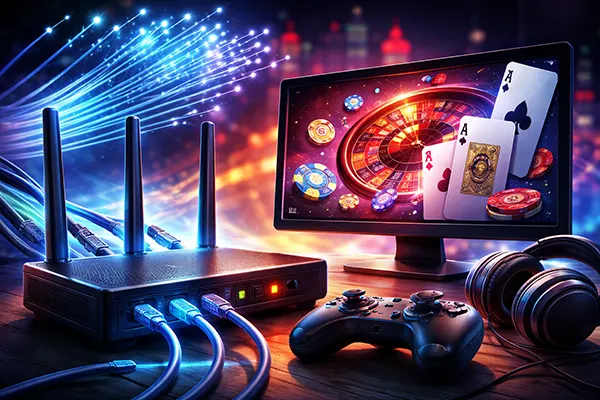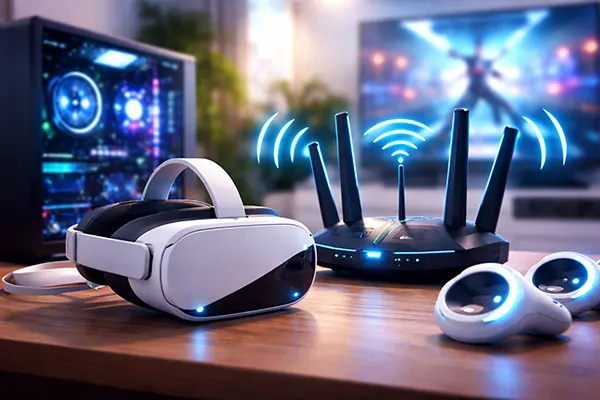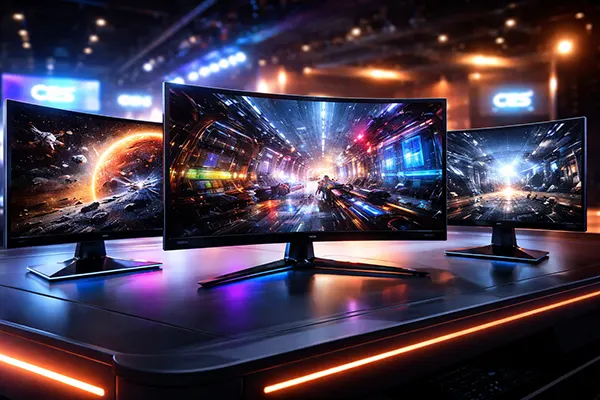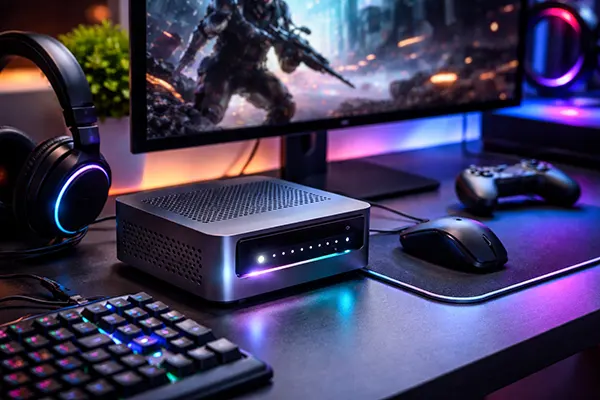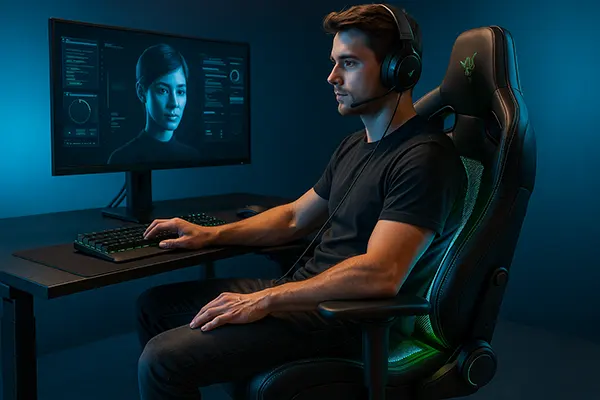
Heat-Regulated Gaming Chairs with AI Assistants: The Future of Player Comfort
In early 2025, gaming innovation took a bold step forward when Razer unveiled two groundbreaking projects at CES — the heat-regulated gaming chair Project Arielle and the AI-powered assistant Project Ava. These technologies are not just about comfort or convenience; they aim to redefine how gamers interact with their hardware, manage their performance, and immerse themselves in long gaming sessions without compromising health or efficiency.
Project Arielle: Construction, Materials, and Thermal Control
Project Arielle stands out as one of the most advanced ergonomic solutions in the gaming world. Razer designed it with high-grade aluminium framing for structural strength and premium memory foam cushions that adapt to the user’s posture. The upholstery uses a breathable, sweat-resistant fabric coated with a micro-layer thermal membrane, ensuring durability and comfort during long gaming marathons.
The chair’s core feature is its integrated thermal regulation system. Built-in Peltier modules, similar to those used in high-end climate seats for automotive industries, provide precise cooling and heating options. This technology allows players to set their preferred seat temperature in real time, ensuring that physical fatigue from heat or cold is minimised even in extended sessions.
Razer’s engineers also integrated adaptive sensors within the seat to monitor body temperature and dynamically adjust the heating or cooling output. This system operates almost silently, ensuring that immersion is never disrupted by mechanical noise. Additionally, the chair connects wirelessly to PC gaming systems, allowing users to sync environmental comfort settings with in-game conditions.
Performance Impact of Thermal Comfort
Maintaining optimal body temperature during intense gaming is more than a luxury; it can significantly affect reaction time, focus, and overall performance. Scientific studies have shown that heat build-up can lead to reduced cognitive sharpness, while cold can impair hand dexterity. Project Arielle’s dynamic temperature regulation addresses both problems, enabling players to sustain peak performance for longer periods.
Moreover, the customisability of the chair’s thermal zones — with independent backrest and seat control — means that comfort can be tailored to each player’s physical preferences. This is particularly important for professional esports athletes, who often endure training sessions lasting six to eight hours daily.
In 2025, Razer announced plans to integrate Project Arielle with health-monitoring apps, allowing users to track posture, hydration reminders, and thermal patterns over time. This elevates the product beyond a gaming accessory into a tool that supports player well-being and injury prevention.
Project Ava: AI Integration for Real-Time Game Support
Project Ava represents Razer’s vision for intelligent in-game assistance. This AI companion connects directly to the user’s gaming rig, monitoring hardware usage, performance metrics, and in-game activity. Built on a neural network optimised for gaming contexts, it can recommend system tweaks, overclock settings, or cooling adjustments to keep the system running at peak efficiency without user intervention.
One of Ava’s standout features is its ability to analyse gameplay patterns and suggest strategic adjustments in real time. For example, in a competitive shooter, it may identify a tendency to favour certain routes and recommend more unpredictable movement patterns to reduce vulnerability. In MOBAs, it can provide reminders for objective timing or team coordination strategies.
Security and privacy were major design considerations. Project Ava processes all personal and gameplay data locally, without uploading sensitive information to external servers. This ensures that users retain full control over their data, an increasingly important factor in the AI-driven product landscape of 2025.
Enhancing the Player’s Edge
By combining performance optimisation with strategic feedback, Project Ava offers players a level of tailored guidance previously only available through professional coaching. Unlike static guides or pre-recorded tutorials, Ava adapts to the individual’s strengths and weaknesses, creating a highly personalised layer of support.
The AI can also be voice-controlled, allowing players to request quick system checks, performance summaries, or tactical advice without pausing their game. This fluid interaction ensures minimal disruption while maintaining competitive focus.
Razer’s roadmap for Project Ava includes expanding compatibility with VR and AR environments, allowing the AI to act as an immersive, in-world companion rather than just a desktop tool. This integration is set to push gaming personalisation into new territory over the coming years.
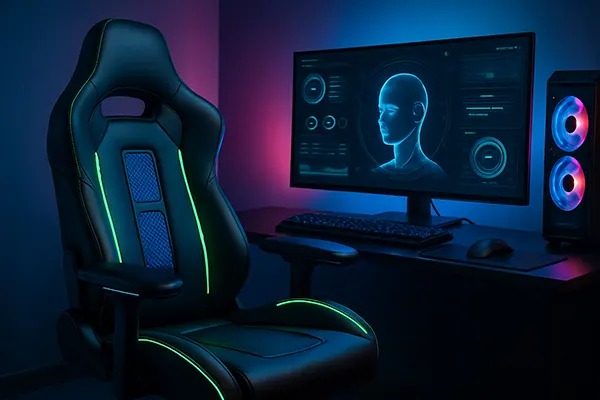
The Future of the Expert Gaming Space
With products like Project Arielle and Project Ava, the gaming environment is evolving into a fully integrated, high-performance ecosystem. The fusion of physical comfort and digital intelligence reflects a shift toward treating gaming as a holistic experience, where hardware and software work seamlessly together to support both performance and health.
In professional esports arenas, such innovations could become standard equipment, much like how performance chairs and ergonomic desks became a norm in the corporate world. Beyond competitive gaming, the average enthusiast stands to benefit from reduced fatigue, optimised hardware performance, and a more engaging, personalised play style.
As we move deeper into 2025, it’s likely that more manufacturers will adopt similar AI-driven comfort and performance solutions. The challenge will be balancing technological advancement with accessibility, ensuring that cutting-edge gaming gear remains within reach for a broader audience rather than being reserved only for elite players.
Integrating Comfort, Intelligence, and Accessibility
The logical progression for this technology will involve merging AI comfort control with other smart home and gaming systems. Imagine a chair that not only adjusts its temperature but also synchronises with ambient lighting, soundscapes, and even nutrition reminders to maintain peak mental and physical readiness.
Another important direction will be modularity. Allowing gamers to upgrade components — such as AI modules or thermal systems — ensures longevity and reduces electronic waste. This aligns with the growing push for sustainable product design in the tech industry.
Ultimately, the synergy of AI assistance and heat-regulated seating signals a new era for gamers, where every aspect of the environment is fine-tuned for performance, comfort, and long-term well-being.

